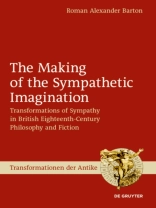How is it that we feel with fictional characters and so approve or disapprove of their actions? For many British Enlightenment thinkers writing at a time when sympathy was the pivot of ethics as well as poetics, this question was crucial. Asserting that the notion of the sympathetic imagination prominent in Romantic criticism and poetry originates in Moral Sentimentalism, this study traces the emergence of what became a key concept of intersubjectivity. It shows how, contrary to earlier traditions, Francis Hutcheson and his disciples successively established the imagination rather than reason as the pivotal faculty through which sympathy is rendered morally effective. Writing at the interface of ethics and poetics, Adam Smith, Lord Kames and others explored the sympathetic imagination as a means of both explaining emotional reader response and discovering moral distinctions. As a result, the sentimental novel became the sight of ethical controversy. Arguing against the dominant view of research which claims that the novel of sensibility is mostly uncritically sentimental, the book demonstrates that it is precisely in this genre that the sympathetic imagination is sceptically assessed in terms of its literary and moral potential.
Roman Alexander Barton
Making of the Sympathetic Imagination [PDF ebook]
Transformations of Sympathy in British Eighteenth-Century Philosophy and Fiction
Making of the Sympathetic Imagination [PDF ebook]
Transformations of Sympathy in British Eighteenth-Century Philosophy and Fiction
Kup ten ebook, a 1 kolejny otrzymasz GRATIS!
Język Angielski ● Format PDF ● Strony 220 ● ISBN 9783110625318 ● Wydawca De Gruyter ● Opublikowany 2020 ● Do pobrania 3 czasy ● Waluta EUR ● ID 9434169 ● Ochrona przed kopiowaniem Adobe DRM
Wymaga czytnika ebooków obsługującego DRM












